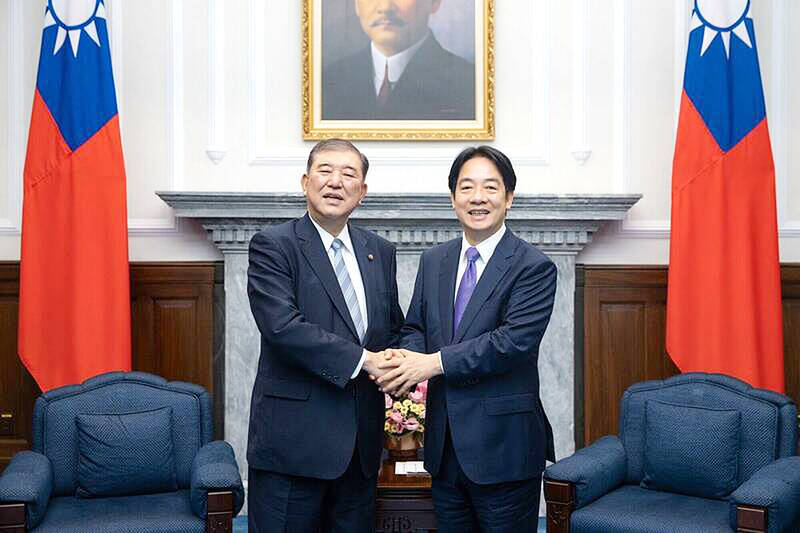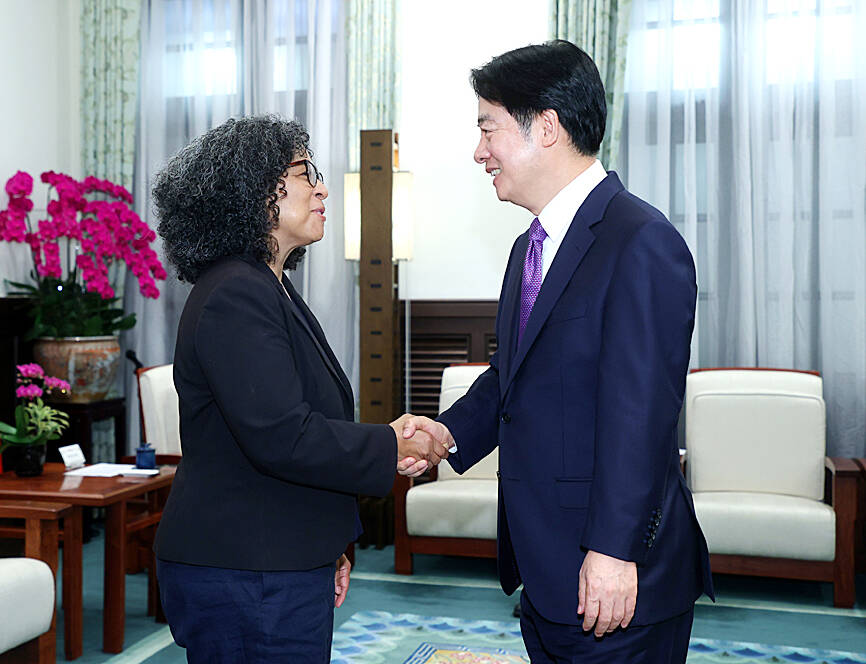President William Lai (賴清德) yesterday reaffirmed his government’s commitment to continue bolstering Taiwan’s defense capabilities through promoting military reforms and increasing spending while meeting with Japanese parliamentarians, and reiterated a similar message in a meeting with US lawmakers on the same day.
Lai made the remarks while hosting a delegation led by Japanese Representative Shigeru Ishiba, adding that Taiwan and Japan should shore up their ties to secure peace and stability in the Indo-Pacific region.
Taiwan and Japan have an abiding friendship that has grown stronger from the shared challenges of earthquakes and the global COVID-19 pandemic, Lai said, adding that the two nations have a brotherly bond.

Photo courtesy of the Presidential Office
Taipei and Tokyo would maintain their partnership to confront more global challenges to come, he said.
Taiwan has the will and determination to protect its national security, and work in partnership with fellow democracies to counter the threat to regional peace posed by China’s rise, Lai said.
Lai outlined his administration’s four pillars of peace, which are defensive military capabilities, economic resilience, alliances with democratic nations, and diplomacy with Beijing under the conditions of equality and dignity.

Photo: CNA
Taiwan would seek to increase its defense capabilities via increasing its domestic arms industry, making foreign military purchases, and the rigorous training of its armed forces to defend the nation and maintain peace in the region, he said.
Taiwan continues to develop its economy while deepening trade ties with Japan and other nations in the global alliance of democracies, including signing the first-phase agreements on the US-Taiwan Initiative on 21st-Century Trade, Lai said.
Concurrently, Taiwan inked the Enhanced Trade Partnership Arrangement with the UK and looks to cooperate more with Japan to combine their economic advantages, he said, adding that Tokyo’s help with the nation’s Comprehensive and Progressive Agreement for Trans-Pacific Partnership application would be deeply appreciated.
Taiwan must stand shoulder to shoulder with its partners in an alliance of democracies to deter China from making misguided decisions, Lai said.
Taipei is willing to engage with Beijing so long as the latter is willing to conduct dialogue based on equality and respect, he said, adding that the nation looks forward to protecting freedom, democracy and peace alongside friends including Japan.
Ishiba, who arrived in Taiwan with a bipartisan delegation of Diet members on Monday for a three-day visit, said Taiwan and Japan should continue their cooperation to strengthen deterrence and promote economic development in the region.
He said the war in Ukraine is protracted because of “insufficient” deterrence mustered by democratic nations against Russia, adding that the urgent task was to prevent Northeast Asia from becoming the next Ukraine.
Also joining Ishiba, who served as Japanese minister of defense from 2007 to 2008, were other members of the Diet’s House of Representatives — Seiji Maehara, Gen Nakatani, Akihisa Nagashima, Shu Watanabe and Keiro Kitagami.
All six, who have either held top government positions related to defense or served in the prime minister’s office, are part of a Diet group focused on Japan’s security and foreign affairs.
Lai later yesterday also conveyed similar messages concerning defense when he met with a delegation of Democrats from the US House of Representatives led by Marilyn Strickland. She was accompanied at the meeting by three other US representatives — Julia Brownley, Jill Tokuda and Jasmine Crockett.
“Security across the Taiwan Strait is crucial to global stability and prosperity,” Lai said. “As a responsible member of the international community, Taiwan will neither yield nor provoke as we seek to maintain the status quo.”
Taiwan also looks forward to collaborating with the US and other partners to promote peace and stability across the Taiwan Strait and in the Indo-Pacific region in the face of authoritarian expansionism, he said.
Strickland, a member of the House Committee on Armed Services, underscored the importance of deterrence in preventing potential Chinese aggression.
As ties between Taiwan and the US have in part “evolved because of potential aggression” from the other side of the Taiwan Strait, “we want to deter anything that will come across the Strait and create a situation where we have to get involved in a conflict,” she said.
“That is not what we want to do,” Strickland said, describing deterrence as being about “projecting strength, power and unity.”
Democratic nations should stand together and continue to promote freedom and democracy, especially with adversaries around the world seeking to destabilize democracy by spreading disinformation and meddling with elections, she said, without specifying who the adversaries were.
Strickland said members of the delegation were “steadfast and resolute in our support for Taiwan.”

CHAOS: Iranians took to the streets playing celebratory music after reports of Khamenei’s death on Saturday, while mourners also gathered in Tehran yesterday Iranian Supreme Leader Ayatollah Ali Khamenei was killed in a major attack on Iran launched by Israel and the US, throwing the future of the Islamic republic into doubt and raising the risk of regional instability. Iranian state television and the state-run IRNA news agency announced the 86-year-old’s death early yesterday. US President Donald Trump said it gave Iranians their “greatest chance” to “take back” their country. The announcements came after a joint US and Israeli aerial bombardment that targeted Iranian military and governmental sites. Trump said the “heavy and pinpoint bombing” would continue through the week or as long

TRUST: The KMT said it respected the US’ timing and considerations, and hoped it would continue to honor its commitments to helping Taiwan bolster its defenses and deterrence US President Donald Trump is delaying a multibillion-dollar arms sale to Taiwan to ensure his visit to Beijing is successful, a New York Times report said. The weapons sales package has stalled in the US Department of State, the report said, citing US officials it did not identify. The White House has told agencies not to push forward ahead of Trump’s meeting with Chinese President Xi Jinping (習近平), it said. The two last month held a phone call to discuss trade and geopolitical flashpoints ahead of the summit. Xi raised the Taiwan issue and urged the US to handle arms sales to

BIG SPENDERS: Foreign investors bought the most Taiwan equities since 2005, signaling confidence that an AI boom would continue to benefit chipmakers Taiwan Semiconductor Manufacturing Co’s (TSMC, 台積電) market capitalization swelled to US$2 trillion for the first time following a 4.25 percent rally in its American depositary receipts (ADR) overnight, putting the world’s biggest contract chipmaker sixth on the list of the world’s biggest companies by market capitalization, just behind Amazon.com Inc. The site CompaniesMarketcap.com ranked TSMC ahead of Saudi Aramco and Meta Platforms Inc. The Taiwanese company’s ADRs on Tuesday surged to US$385.75 on the New York Stock Exchange, as strong demand for artificial intelligence (AI) applications led to chip supply constraints and boost revenue growth to record-breaking levels. Each TSMC ADR represents

Pro-democracy media tycoon Jimmy Lai’s (黎智英) fraud conviction and prison sentence were yesterday overturned by a Hong Kong court, in a surprise legal decision that comes soon after Lai was jailed for 20 years on a separate national security charge. Judges Jeremy Poon (潘兆初), Anthea Pang (彭寶琴) and Derek Pang (彭偉昌) said in the judgement that they allowed the appeal from Lai, and another defendant in the case, to proceed, as a lower court judge had “erred.” “The Court of Appeal gave them leave to appeal against their conviction, allowed their appeals, quashed the convictions and set aside the sentences,” the judges